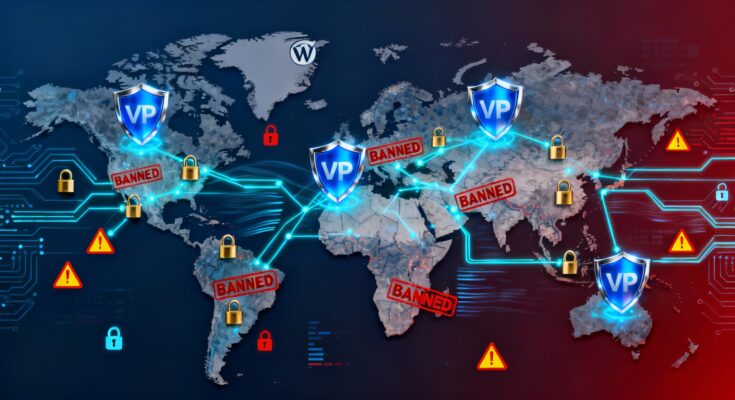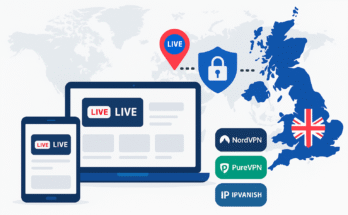The online freedoms that we once took for granted are increasingly under attack. VPNs have grown in popularity in tandem with the rising tide of censorship, a way to bypass Big Brother governments and surf the Web privately, securely, and without fear. However, some draconian authorities – such as the UK, and more recently the state of Michigan in the USA, have been considering bans on VPNs. If any Western democracy went through with such a ban, they would be joining quite a company of infamous and despotic regimes who have already made VPNs illegal. This post will explore ten countries in which the downloading or use of VPNs is a crime, as well as highlighting their often appalling human rights records.
China
In China, VPNs are not outright illegal but are heavily restricted. Only government-approved VPNs (which often include backdoors for surveillance) are permitted; unauthorized ones are banned. This is enforced via the “Great Firewall,” which blocks VPN apps and detects VPN traffic. Punishments for using or downloading an unauthorized VPN can include fines up to 15,000 yuan (about $2,100 USD) or up to 5 years in prison, though enforcement is rare for individuals and more common for providers.
China’s human rights record is poor, with widespread censorship, surveillance, and suppression of dissent. Freedom House rates it as “not free,” citing mass detentions (e.g., Uyghur Muslims), forced labor, and crackdowns on free speech and assembly.
Russia
VPNs are completely illegal in North Korea, where internet access is limited to a state-controlled intranet (Kwangmyong). Unauthorized internet tools like VPNs are banned to prevent external information flow. Punishments can include imprisonment in labor camps, fines, or even execution in extreme cases, though specifics are hard to verify due to secrecy.
North Korea has one of the world’s worst human rights records, with widespread forced labor, political prisons, and no freedom of expression. Human Rights Watch documents torture, starvation, and executions, rating it as a highly repressive regime.
Belarus
Belarus bans VPNs and anonymizing tools like Tor outright, adding them to a restricted access list. While not explicitly illegal by law, using them can lead to fines of up to 300 base units (about $3,000 USD) or detention, especially during protests.
Belarus’s human rights record is abysmal, with rigged elections, violent suppression of protests, and media censorship. Freedom House labels it “not free,” highlighting arbitrary arrests and torture under President Lukashenko’s authoritarian rule.
Turkmenistan
Turkmenistan bans VPNs entirely, forcing citizens to swear on the Quran not to use them. Enforcement includes ISP blocks and monitoring. Punishments involve unspecified fines or imprisonment, with reports of detentions for online dissent.
Human rights in Turkmenistan are severely restricted, with no free press, forced labor in cotton fields, and widespread surveillance. Human Rights Watch reports torture and disappearances, classifying it as one of the most repressive states globally.
Iran
Iran bans non-government-approved VPNs since 2013. Approved ones are monitored, while unauthorized use can lead to fines or up to 1 year in prison, especially during protests.
Iran’s human rights record includes suppression of women’s rights, executions, and internet shutdowns during unrest. Freedom House rates it “not free,” noting discrimination against minorities and violent crackdowns on dissent.
Iraq
Iraq has banned all VPNs since 2014, with no exceptions, to curb extremism. Punishments include fines or up to 1 year in prison for usage.
Iraq’s human rights situation is fragile, with ongoing sectarian violence, corruption, and restrictions on free speech. Human Rights Watch documents torture by security forces and attacks on journalists.
Turkey
Turkey restricts VPNs and Tor since 2016, blocking non-compliant providers. Using them to access banned content can result in fines or imprisonment, justified as anti-terrorism measures.
Turkey’s human rights record has worsened, with mass arrests of journalists, Kurds, and opposition figures. Freedom House classifies it as “not free,” citing erosion of judicial independence and media freedom under President Erdogan.
Myanmar
Myanmar banned VPNs in 2022 after a military coup, allowing random phone checks. Punishments include up to 3 years in prison or fines .
Myanmar’s human rights are in crisis, with genocide against Rohingya Muslims, military atrocities, and internet blackouts. Human Rights Watch reports widespread killings and detentions since the 2021 coup.
Pakistan
Pakistan requires VPNs to register and share data with authorities, making unregistered ones effectively illegal. Punishments include fines or imprisonment for non-compliance (CyberGhost VPN; Surfshark).
Pakistan’s human rights record includes blasphemy laws leading to mob violence, restrictions on minorities, and media censorship. Freedom House rates it “partly free,” with issues like enforced disappearances and gender-based violence.
Conclusion
VPN bans correlate closely with broader human rights issues, where governments prioritize control over freedom. If any Western country – such as the United Kingdom – does start to take measures against VPNs, it would be hard to argue that it is not slipping into being an authoritarian and dystopian society. As Robert F Kennedy Jnr. once said, “There was no time in history where the people who were censoring free speech were the good guys.”
Meanwhile, if you’re in or traveling to any of the countries listed above, consider the risks and opt for VPNs with strong obfuscation features. Always prioritize legal compliance and stay informed.



